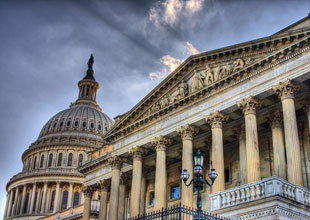
The US Capitol Building at sunset. Photo by vgm8383, <a href="http://www.flickr.com/photos/vgm8383/2034624215/">via Flickr</a>.
Leaks and rumors are swirling about the climate and energy package from John Kerry (D-Mass.), Lindsey Graham (R-SC), and Joe Lieberman (I-Conn.). From what I’ve heard from sources briefed on the outline, the senators have reached agreement on some specifics, but much of it remains in flux.
In a lot of ways it’s not that much different from the House bill, though it doesn’t cover as much of the economy and it also seems likely to include a lot of sweeteners for things like coal, oil, and nuclear power. Brad Johnson at Wonk Room put together a good chart comparing the two bills, as well as what Barack Obama outlined both on the campaign trail. But, as I’ve noted, a lot of specifics are still in flux and there will likely be efforts to weaken it after it’s released. Also, if the Chamber of Commerce and American Petroleum Institute like it, there are probably some other significant changes from the House-passed bill, which both groups opposed.
Congressional Quarterly put together a list of what is probably in the bill at this point, at least according to the information reporters are getting from those briefed on the outline. Their list is in line with what I’ve heard from participants. Here’s their list:
- An economy-wide cap on carbon emissions that would begin in 2012, with a target of reducing carbon pollution 17 percent by 2020 and 80 percent by 2050.
- Separate caps on carbon emissions by the electric utilities and manufacturing sectors, which would have to buy permits to pollute from the federal government.
- A straight fee or tax, paid by consumers at the pump, on transportation fuels. The levy would be linked to the carbon content of the fuel and the price of carbon in the other markets.
- A combination for the regulated sectors of a “cap and trade” model, under which polluters could trade pollution permits on an open market, and a “cap and dividend” model, which would return revenue from the sale of permits directly to consumers.
- Direct rebates to consumers of half the revenue from the sale of pollution permits.
- Delay until 2016 in starting the phase-in of carbon caps on manufacturers.
- Application of a “carbon tariff” to imports of goods from countries that do not regulate their carbon emissions.
- A “hard collar” on the price of emission permits of no less than $10 per ton of carbon emitted and no more than $30 per ton. The government would keep a strategic reserve of 4 billion credits, and would flood the market if the carbon price exceeded $30 per ton. The price would be indexed to inflation rates and rise over time.
- A threshold of 25,000 tons of carbon per year before a polluter would be subject to regulation.
- A single federal system to cap emissions, pre-empting separate state limits.
The senators may release their detailed outline next week, and legislative language is expected shortly after Easter recess. Modeling of the bill from the Environmental Protection Agency is expected to take five to six weeks. According to sources in the briefings, Kerry expects to have the bill ready to go to the floor in early May, after the Senate considers financial reform legislation.










